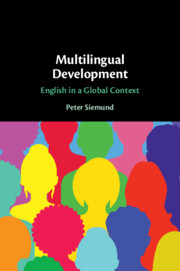Book contents
- Multilingual Development
- Multilingual Development
- Copyright page
- Epigraph
- Contents
- Figures
- Tables
- Preface
- Acknowledgements
- About the Author
- 1 Multilingualism
- 2 On Advantages and Effects of Multilingual Development
- 3 Cross-Linguistic Influence
- 4 Language Development in Multilingual Settings
- 5 Multilingual Language Policies, Identities, and Attitudes
- 6 The New Englishes in Their Multilingual Ecologies
- 7 Patterns and Limits of Multilingualism
- References
- Index
4 - Language Development in Multilingual Settings
Published online by Cambridge University Press: 17 January 2023
- Multilingual Development
- Multilingual Development
- Copyright page
- Epigraph
- Contents
- Figures
- Tables
- Preface
- Acknowledgements
- About the Author
- 1 Multilingualism
- 2 On Advantages and Effects of Multilingual Development
- 3 Cross-Linguistic Influence
- 4 Language Development in Multilingual Settings
- 5 Multilingual Language Policies, Identities, and Attitudes
- 6 The New Englishes in Their Multilingual Ecologies
- 7 Patterns and Limits of Multilingualism
- References
- Index
Summary
Chapter 4 explores potential advantages of multilingual upbringing in relation to further language development. It argues that any such advantages play out more forcefully and are easier to identify in regard to general proficiencies rather than specific grammatical phenomena. Chapter 4 further argues that type of bilingualism, as operationalized in terms of language dominance, and the type of language knowledge investigated play a pivotal role for understanding language learning processes against a multilingual substrate. Cross-linguistic influence, as observable in different grammatical domains and the lexicon, can aid additional language acquisition by means of cumulative enhancement, but certain constellations also produce inhibitory effects. The assumption of universally facilitating effects has turned out to be overly optimistic and needs to be tempered. Much of the discussion in Chapter 4 is based on the acquisition of English as an additional language in bilingual heritage contexts (third language acquisition). Besides general CEFR-proficiencies, the case studies concern determiners, subject–verb agreement, tense and aspect, word order, and lexical cross-linguistic influence.
Keywords
- Type
- Chapter
- Information
- Multilingual DevelopmentEnglish in a Global Context, pp. 96 - 147Publisher: Cambridge University PressPrint publication year: 2023



